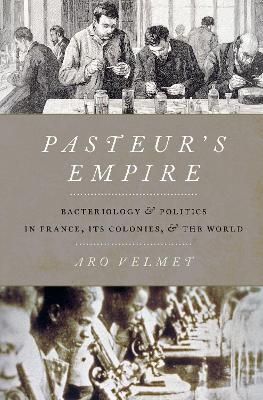
Pasteur's Empire
Bacteriology and Politics in France, Its Colonies, and the World
Seiten
2020
Oxford University Press Inc (Verlag)
978-0-19-007282-7 (ISBN)
Oxford University Press Inc (Verlag)
978-0-19-007282-7 (ISBN)
Why did "microbe hunters" at the Pasteur Institute become the most important health experts in the French empire in the early twentieth century? Pasteur's Empire illustrates how French microbiologists transformed life in the colonies in the name of humanitarian public health, which often had grave consequences for those living under French rule.
In the 1890s, the Pasteur Institute established a network of laboratories that stretched across France's empire, from Indochina to West Africa. Quickly, researchers at these laboratories became central to France's colonial project, helping officials monopolize industries, develop public health codes, establish disease containment measures, and arbitrate political conflicts around questions of labor rights, public works, and free association.
Pasteur's Empire shows how the scientific prestige of the Pasteur Institute came to depend on its colonial laboratories, and how, conversely, the institutes themselves became central to colonial politics. This book argues that decisions as small as the isolation of a particular yeast or the choice of a laboratory animal could have tremendous consequences on the lives of Vietnamese and African subjects, who became the consumers of new vaccines or industrially fermented intoxicants. Simultaneously, global forces, such as the rise of international standards and American competitors pushed Pastorians to their imperial laboratories, where they could conduct studies that researchers in France considered too difficult or controversial. Chapters follow not just Alexandre Yersin's studies of the plague, Charles Nicolle's public health work in Tunisia, and Jean Laigret's work on yellow fever in Dakar, but also the activities of Vietnamese doctors, African students and politicians, Syrian traders, and Chinese warlords. It argues that a specifically Pastorian understanding of microbiology shaped French colonial politics across the world, allowing French officials to promise hygienic modernity while actually committing to little development. In bringing together global history, imperial history, and science and technology studies, Pasteur's Empire deftly integrates micro and macro analyses into one connected narrative that sheds critical light on a key era in the history of medicine.
In the 1890s, the Pasteur Institute established a network of laboratories that stretched across France's empire, from Indochina to West Africa. Quickly, researchers at these laboratories became central to France's colonial project, helping officials monopolize industries, develop public health codes, establish disease containment measures, and arbitrate political conflicts around questions of labor rights, public works, and free association.
Pasteur's Empire shows how the scientific prestige of the Pasteur Institute came to depend on its colonial laboratories, and how, conversely, the institutes themselves became central to colonial politics. This book argues that decisions as small as the isolation of a particular yeast or the choice of a laboratory animal could have tremendous consequences on the lives of Vietnamese and African subjects, who became the consumers of new vaccines or industrially fermented intoxicants. Simultaneously, global forces, such as the rise of international standards and American competitors pushed Pastorians to their imperial laboratories, where they could conduct studies that researchers in France considered too difficult or controversial. Chapters follow not just Alexandre Yersin's studies of the plague, Charles Nicolle's public health work in Tunisia, and Jean Laigret's work on yellow fever in Dakar, but also the activities of Vietnamese doctors, African students and politicians, Syrian traders, and Chinese warlords. It argues that a specifically Pastorian understanding of microbiology shaped French colonial politics across the world, allowing French officials to promise hygienic modernity while actually committing to little development. In bringing together global history, imperial history, and science and technology studies, Pasteur's Empire deftly integrates micro and macro analyses into one connected narrative that sheds critical light on a key era in the history of medicine.
Aro Velmet is Assistant Professor of History at the University of Southern California.
List of Illustrations and Maps
Acknowledgments
Introduction: Technology and Scale in Colonial Politics
1. The Invention of Pastorization
2. Pastorization and Its Discontents
3. Monks and Warriors, Bureaucrats and Businessmen
4. The Making of Imperial Tuberculosis
5. BCG and Technopolitics from Europe to Empire
6. The Racial Politics of Microbes in Colonial Dakar
7. Africa in the Global Race for a Yellow Fever Vaccine
Conclusion: Pastorian Origins of Global Health
Notes
Bibliography
Index
| Erscheinungsdatum | 31.12.2019 |
|---|---|
| Zusatzinfo | 16 illustrations and 3 maps |
| Verlagsort | New York |
| Sprache | englisch |
| Maße | 246 x 163 mm |
| Gewicht | 658 g |
| Themenwelt | Geschichte ► Allgemeine Geschichte ► Neuzeit (bis 1918) |
| Geschichte ► Teilgebiete der Geschichte ► Wirtschaftsgeschichte | |
| Studium ► Querschnittsbereiche ► Geschichte / Ethik der Medizin | |
| Naturwissenschaften | |
| ISBN-10 | 0-19-007282-2 / 0190072822 |
| ISBN-13 | 978-0-19-007282-7 / 9780190072827 |
| Zustand | Neuware |
| Haben Sie eine Frage zum Produkt? |
Mehr entdecken
aus dem Bereich
aus dem Bereich
Europa 1848/49 und der Kampf für eine neue Welt
Buch | Hardcover (2023)
DVA (Verlag)
48,00 €
Giordano Bruno - ein ketzerisches Leben
Buch | Hardcover (2024)
C.H.Beck (Verlag)
29,90 €


